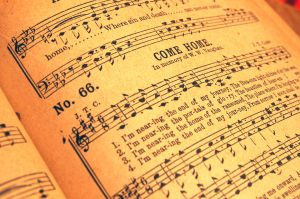Powerpoint worship
 When we visited Kentucky last week, we attended the Free Methodist church I belonged to when I lived there. The worship consisted of a mixture of hymns and choruses. The hymns were in hymnals, and the choruses were in a small black binder. For all the songs, the words and musical score were printed together on the page, as is typical of hymn books. Instrumentally, the worship team included an organ, a piano, a few guitars, a base, and a flute. The instrumentation gave the hymns a contemporary “feel,” but we sang the traditional melodies and chords.
When we visited Kentucky last week, we attended the Free Methodist church I belonged to when I lived there. The worship consisted of a mixture of hymns and choruses. The hymns were in hymnals, and the choruses were in a small black binder. For all the songs, the words and musical score were printed together on the page, as is typical of hymn books. Instrumentally, the worship team included an organ, a piano, a few guitars, a base, and a flute. The instrumentation gave the hymns a contemporary “feel,” but we sang the traditional melodies and chords.
It was a great experience. I loved having the whole song before me, including the written score. I know that many of these songs and hymns cultivated my literacy in both theology and music. Reading music in my piano lessons was just a continuation of the singing we did in church growing up; watching the notes go up and down on the page in the hymn book reinforced what I was learning from the pages of my piano lesson books. And the meaty texts of hymns, in which over and over again, the hymn writers met the challenge to fit theology within the limits of a fairly strict form, are deeply ingrained in my thinking to this day. Those hymns develop lines of thought in phrases that still replay in my mind.
I greatly prefer having the whole text in front of me. I have heard arguments over the years about how hymn books isolate people — after all, everyone stares at the page of their own book. But it’s not true. For one thing, I had to share a hymn book with a complete stranger. For another, I love being able to store up a few lines, glancing ahead in the music, and then looking up to survey the faces of others singing, or the stained glass window in the front, or the musicians, or the sunlight coming in the windows. This enhances the worship for me, and reinforces how connected we all are as we sing. I enjoyed being able to glance back, too, if I wanted to — at what we’d already sung. These things — the eye wandering ahead of where the mind is, or back to where it was, all the while singing — are much truer to the way I read a book, and they release me from the stranded feeling I have from powerpoint slides that strap the mind to one place, or even from the small screen of my Kindle. I like being awash in words and context, when I read and when I worship.
My daughters were disoriented by the hymn and chorus books. They are used to seeing a few lines of words at a time projected on a screen in the front of the church, usually with some inspiring visual background. I felt sad that they don’t have an inkling of the experience and skills that were so formative in my own spiritual life, and I wonder what replaces these literacies in this generation of believers.




15 Comments
GretchenJoanna
I don’t think there IS anything replacing this sort of experience, and I’m so glad you wrote about the loss. I have had many of the same thoughts over the years. I used hymnal-singing as a tool for teaching reading, as I used to have whoever was my beginning reader next to me in church and encourage her to follow along above my finger watching the words. Later all the children learned to read music, so I suppose that early exposure provided exposure in that area, too.
The way a stanza appears instantly and singly on the overhead is disconcerting in all the ways you mention, and somehow echoes the whole culture’s lack of connection to history and context.
Dennis King
I’m afraid that I don’t have much to contribute to this discussion, particularly since as a pastor I’ve helped preside over this transition from hymnal-holding to screen-staring. But I must confess that there is much I miss about hymn-singing, especially their lyrical richness and four-part harmonies. I’ve also been thinking that the writers of our hymn lyrics tended to be theologians — people who thought deeply about God and His Word. Now it seems that we don’t even think at all about the words of the songs we sing in church, as long as they have a catchy tune and a feel-good message. I fear that in our drive to be “relevant”, we’re become increasingly irrelevant to a world that desperately needs to know this transcendent, holy God that we worship.
Polly
I love hymns. I didn’t grow up in the church and when I first encountered hymns(about 4 years after coming to faith) my heart would just soar because I recognized so often the word of God and rich theology. I am not a music reading person so I don’t miss the hymnals much, but I do miss hymns.
Janet
It occurred to me after writing this that I could teach the girls some hymns. We could have a morning time at the piano together. It would at least acquaint them with some of those riches. (I know there are even “hymn curricula” for home schoolers. I’m not sure whether I’d want to go that route.)
But a big part of the power of these songs in my own spiritual formation is that we sang them together. They were a part of our community life. I wonder if they functioned, in the evangelical church I grew up in, a bit like a liturgy — our book of praise, prayer, and confession of the great truths we lived by.
Amy @ Hope Is the Word
Janet, I so identify with this post! Maybe not so much the missing singing from a book part; growing up, we didn’t use a screen, but we sang the same songs over and over so many times we didn’t NEED a book! I am teaching my girls hymns, even ones I don’t know. I do think the church is poorer god its lack of theologically solid songs.
Amy @ Hope Is the Word
For, not god! (How’d that happen?!?$
Janet
That’s neat that you’re teaching some hymns that are new to you, too. It puts you all in the same boat.
Do you use Hymns for a Kid’s Heart? I put a book on loan from the library that tells the stories of 150 hymns, and I found some resources for hymn study here:
http://www.squidoo.com/hymn-study
It’s still not the same as learning them in the context of the church, though. It almost has the same feel as studying Latin — a “dead language,” valuable but no longer part of our shared experience.
Amy @ Hope Is the Word
Yes, we use Hymns for a Kid’s Heart. Really, though, since I personally get so much out of most of the hymns myself, in some ways it is a shared worship experience when I sing them with my girls (in other words, it’s not entirely academic). I understand what you mean, though, about not sharing it with the Body. I’m going to check out your resources!
Carol in Oregon
Oh, the thoughts in this post touch the passionate side of me. I believe we are losing something precious when we ditch the hymnbooks. It’s interesting reading this post today: I’m visiting my family and went to my home church where we sang to PowerPoint and I used a Kindle for my Bible.
I am having a hard time distilling my thoughts into reasonable comment size. I think I will write a blog post and link back here.
You’ve stirred me up, Janet.
Janet
Looking forward to your post, Carol!
Alice@Supratentorial
“I like being awash in words and context, when I read and when I worship.”
Beautiful image!
Carrie, Reading to Know
Again I say “huh.” This has been a rather huge topic of conversation in our household over the past few months.
I’ve grown up with both. Currently we’re in a church that does not use a projector screen and only sings from the hymn book. And I do find it enormously isolating and frustrating, precisely because everyone is looking down (and also being very nit-picky about which songs are sung and why.) The HEART of worship feels completely lost while everyone is instead choosing to focus on reading the music. It’s even more about the music than the words which makes me want to snatch every hymn book from the hands and pitch them! That might, perhaps, be an overreaction. ;) However, I am quite quite putout with the hymn books at the moment!
A mixture would, I think, be nice. I’m perfectly satisfied with providing the music but my personal experience has been that corporate worship is just that when a hymn book isn’t present. Again, personal experience. I do find it frustrating.
Janet
I’m actually on a worship team, and we do mostly contemporary songs. I would never say that worship can’t happen with choruses and powerpoint. What was striking to me about this experience at the other church was that my girls were completely lost. The had no ability to enter into this other kind of experience — they couldn’t read the music, the words, and they had no familiarity with the well-known hymns we were singing. It made me sad, the same way other kinds of illiteracy make me sad. Everyone doesn’t have to like the same songs or same style, any more than everyone should like the same books. But to be able to read them gives a freedom and richness and depth to one’s faith and prayer life. And it provides a dimension of experience in corporate worship that is, for some reason, missing, and that I had forgotten about — until I stumbled upon it in this visit to the other church.
As far as everyone being nit-picky and getting isolated from having to read the music — well, I can see how that would be frustrating! Hopefully that’s just a stage on the way to what Amy describes — getting familiar enough with the songs that they don’t require that kind of attention.
Carrie, Reading to Know
Yes, that makes sense. Right now we’re at a place where a worship leader is bad, anyone singing into a microphone is bad, anything written in the last 100 years is bad. And difficult to sing. I’M lost!!!
Which again makes your point that it’s sad when people are unfamiliar with hymns of the past. I think I have a decent repertoire but I’m being stretched. The problem is that so many others are also — and we aren’t taking the time to learn and, thus learn to appreciate. It’s all about rules. Which removes the heart and that’s distressing to me (and drives me nuts.)
I think a combination is best and I do see the point of encouraging children to learn to read the music, learn the verses and appreciate the richness which is our Christian musical history.
Sigh. Such a hard topic, really, overwhelmed by so many strong opinions!
Janet
That does sound like a tough situation. I feel for you!
At our old church, they used to say we shouldn’t “major on the minors” — shouldn’t get worked up about peripheral things that can become so divisive. Easy to say, but sometimes hard to practice, I guess.